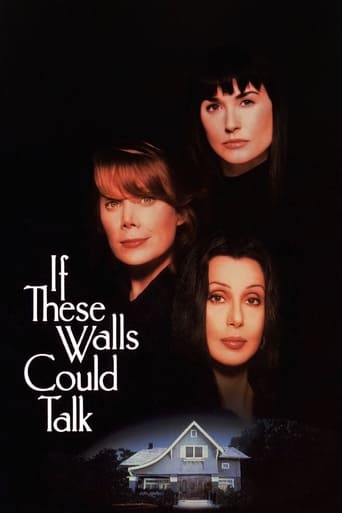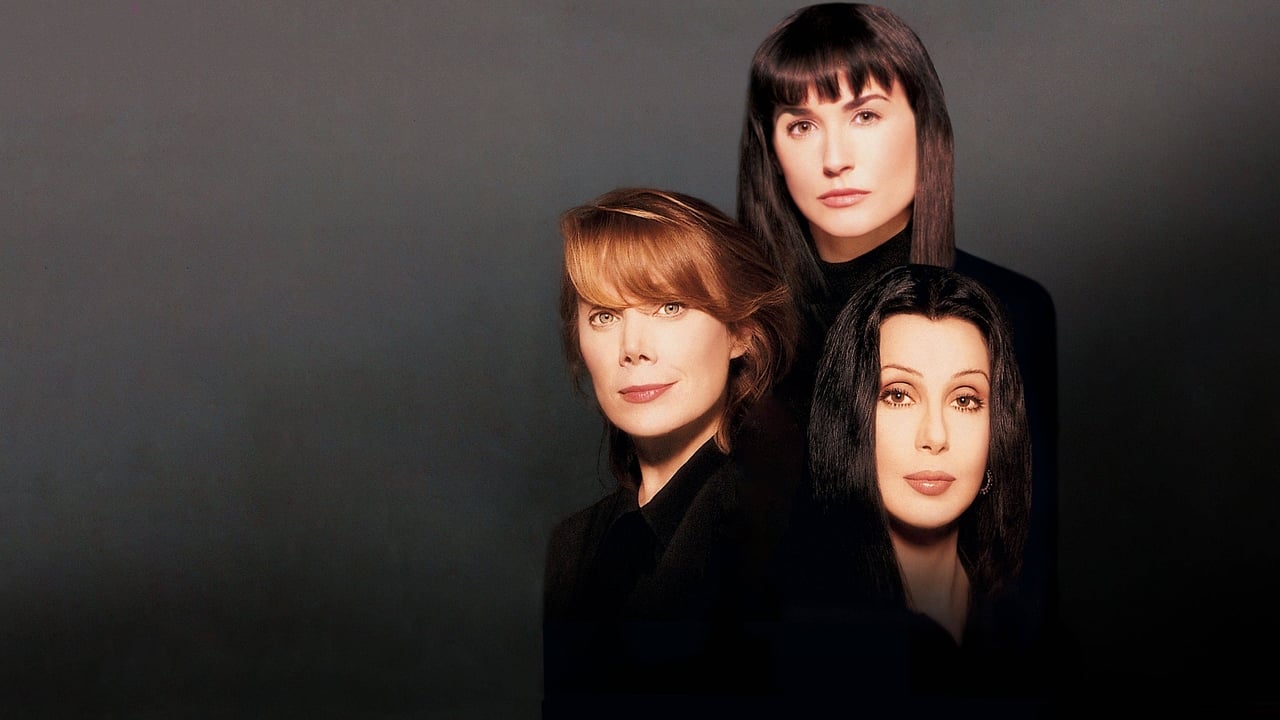secondtake
If These Walls Could Talk (1996)Three half hour movies with three distinct casts (each featuring a superstar) and each tied together by occurring in the same house, each twenty years apart. In each episode, a woman needs an abortion, and with great realism and sometimes great drama, they deal with the problem in terms of the era they were born into. The first is the best, and features Demi Moore as a woman in 1952, when abortion is not only illegal but utterly shameful to consider for most people. But Moore's character is a sympathetic one, and if you feel she should "just have the baby" as some in the movie do, she could only do so at great sacrifice (if losing your job, your friends, and your current life by having a baby and giving it away is a sacrifice). She eventually tries to get a fly-by-night provider.The second episode is also really strong, and has a vivid, realistic depiction of a 1974 household. This is when abortion has been made emphatically legal by Roe v. Wade, and so the mother of four played by Sissy Spacek finds herself pregnant. The issue then becomes whether or not have a legal abortion. Her husband and others (including a feminist teenage daughter) advise and pressure her. It's now become a legitimate "choice" in the true "pro choice" sense of the word.The third episode is a dud. That's not to say it's dull. But the first two segments were filled with internal, intimate dilemmas and decisions. They depict contemporary life and make real the problem women faced in those terms. Here the "family" is a pair of college-aged roommates, one of who can't act. The other is pregnant and goes to the local woman's clinic to check it out (and possibly have the procedure). Outside are some protesters. So far so good—this is the more recent 1996 reality, and it fills out the set. But the mood shifts to politics and social circumstance, and to sensation. Furthermore, the star actress is not the one who is pregnant, but the clinic doctor, played by Cher (who also co-directed this segment). It seems far too gratuitous, and since it comes at the end of the movie, it undermines the subtle power of the first two thirds.Still, overall, director/writer Nancy Savoca deserves a bow. She takes on a tough issue and more or less tells it like it is. Her stance is clear—she's for women's rights, and not sympathetic to the protesters and naysayers—but she deals with both sides fairly. (I'm sure an anti-choice viewer might disagree here.) And Demi Moore gets credit for pushing the whole idea for years beforehand. The usual studios wouldn't touch it with a ten foot pole, and it took a youthful HBO to give it a run.The movie taken whole is, in a way, pro life. That is, it's for what is "best" in the normal sense, the same sense that my mother was pro choice and chose to have me.
TheOtherFool
I watched If These Walls Could Talk II (which is much more accessible here in the Netherlands) before this one, but I must say I'm not too impressed with either of them.This one picks up the issue of abortion, telling three tales in three different periods. In the first, a woman is pregnant by her dead husbands brother. In the second, a mother of 4 who is finally ready to live for herself finds herself pregnant yet again. And in the third, a young woman is pregnant by her professor.The movie is showing us how abortion laws and ideas about it change over the years. Some scenes were hard to watch (in particular in segment no 1) and one of the movie's conclusion is that it's best that women have the ability to have an abortion in a clean and safe envirement.Although I agree with that, I still have major problems with the concept of abortion. I feel it's often an easy way out for people who should've known better (I'm aware of the many exceptions). But never mind that, I should value the movie for what it is.And it just ain't that good, I'm afraid. 5/10.
Lavake
Great movie, although it rather is a documentary... The abortion-scandal is well displayed and the director, producers and the cast can be proud of their work. The last story (with Cher) is based on real documentary-footage, so the things the anti-abortion-club does and the things these people say, were really done and said. A movie you MUST see if you are at all interested in the abortion-case.
daisy3-3
I just watched this movie in my Women and Feminism class and at first I was surprised why the teacher would choose such a disturbing movie to be presented to a room full of teenagers. I understand the teacher's argument would probably be that those teenagers are most likely sexually active and therefore need to be informed of what the reality is really like but I know the very graphic scenes can instantly make an average person to stay or become pro-life and I guess that would be missing the point the film was trying to accomplish. I also think the film is saturated with way too many cliches and was desperately trying to fight off the stereotypes. The first one that automatically pops into my head is the character of Jada Pinkett who is black and very much pro-life. It's one to make her character such an advocate of life when statistically speaking most blacks than whites are getting abortions in this country (purely economic reason I suppose) but to make her Ann Heche's best friend was just too politically correct for me. Why not just make Jada Pinkett the pregnant one, wouldn't that be more true to what the stats indicate? Why being so PC?Another one, Sissy Spacek is 40 something and decides not to get an abortion. What a cliche! Do only teens and nuns get abortions? I think the makers of this movie should have handled such delicate subject more carefully by not offering so many cliches. A young student gets pregnant by having an affair with a married man, a young girl gets pregnant by a one night stand, a middle aged mother can handle another baby... Why didn't they mentioned pregnancy as a result of child abuse and / or rape? I just think the stories could have been a lot more interesting. Why so much of an hype at the end? We all know not every doctor performing abortions gets shot. It happens rarely. Why include that in the movie?
One thing for sure, every man should see this movie at least one and then be forced to talk about his feelings on it.


 AD
AD





